Advanced Heart Failure
Pursuing Progress on Many Fronts
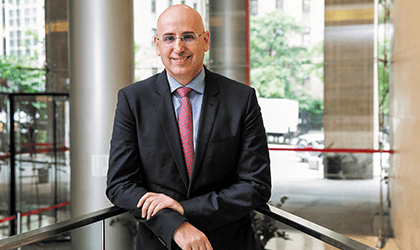
Dr. Nir Uriel
According to the American Heart Association, of the more than six million Americans living with heart failure, about 10 percent have advanced heart failure, a field that has grown dramatically in the last two years. “Unfortunately, more and more patients are suffering from heart failure, and not every patient is able to access the level of care they need,” says Nir Uriel, MD, an internationally recognized physician-scientist and the newly appointed Director of Advanced Heart Failure, Cardiac Transplantation and Mechanical Circulatory Support Programs at NewYork- Presbyterian. “There are options today that can help improve quality of life and increase longevity. Our goal is to reach as many of these patients as possible, regardless of where they live or their means, and provide them with the most advanced care so that they can enjoy life and have more time with their families and loved ones.”
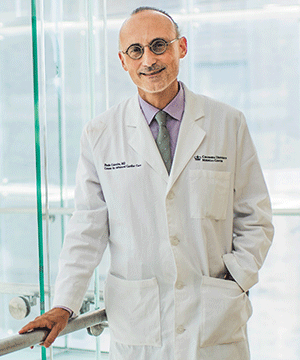
Dr. Paolo C. Colombo
In his new role, Dr. Uriel oversees heart failure programs at NewYork-Presbyterian’s campuses in Manhattan, Queens, Brooklyn, and Westchester, with a goal to increase accessibility of care for those with advanced heart failure throughout New York and the surrounding regions. The expanded program builds on an initiative begun in 2017 to standardize care for patients with heart failure across all the campuses of NewYork-Presbyterian. “We created a uniform pathway for the treatment of heart failure, which is applied at every NewYork-Presbyterian hospital,” says Paolo C. Colombo, MD. “Each hospital was actively engaged in reviewing the clinical dashboard to guide practice improvements. This culminated in implementation of guidelines and evidence-based standards for inpatient care, outpatient management of heart failure, and transitions of care.”
Trials and Triumphs in Heart Transplantation
“The heart transplant program at NewYork-Presbyterian is the biggest in the New York metropolitan area and one of the biggest in the country,” says Dr. Uriel. “This program has a long history with great success over many years performing heart transplantation and multi-organ transplants such as heart-kidney, heart-liver, and heart-lung transplantation.”
“2019 marks the 42nd year of our heart transplant program,” says Koji Takeda, MD, PhD. “In 2018, we performed 84 transplants bringing the total number of transplants at this center to more than 2,000. Data as of December 2019 show a one-year survival of 90 percent and three-year survival of 85 percent.”
NewYork-Presbyterian’s heart transplant specialists continue to pursue improvements in treatment protocols for high-risk transplant populations and define new approaches to increase heart transplantation as a treatment option for patients in end-stage heart failure. As one example, a new program for the use of hepatitis C viremic donors is increasing the availability of heart transplantation for those patients with longer waiting times on the list. A course of anti-viral therapy is administered at 12 weeks after transplant to cure the transmitted hepatitis C virus.
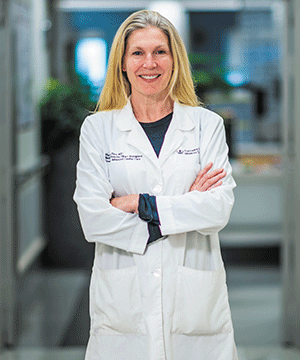
Dr. Maryjane A. Farr
“To some extent we’re pursuing a personalized precision medicine approach around organ transplantation,” says Maryjane A. Farr, MD. “As we learn more about immunosuppressive therapies and ways in which we can monitor the immune system, we are able to give patients only what they need for immunosuppression and not more. We hope that being able to better refine the medications that one individual may need over another will translate into longer-term survival and a better quality of life for a heart transplant recipient.”
“Here, in the NewYork-Presbyterian heart transplant program, we are trying to see how we can transplant patients who are considered to be too high risk for heart transplantation in other programs,” says Gabriel Sayer, MD. “Patients with a high level of antibodies who, historically, couldn’t receive heart transplantation, are being transplanted at NewYork-Presbyterian/ Columbia University Irving Medical Center following novel desensitization protocols and the use of eculizumab, a new medication that allows us to overcome these immunological challenges. Furthermore, we were a pioneering center in transplanting HIV patients, and our research demonstrated that this group of patients do not carry a higher risk and should be eligible for advanced therapies.
A Landmark Change for LVADs
NewYork-Presbyterian offers one of the largest and most innovative ventricular assist device (LVAD) programs in the nation. The program led the original study to assess LVADs in patients with advanced heart failure who were not candidates for heart transplantation (the REMATCH study) and was a leader of the recent, seminal MOMENTUM 3 study that just ended this year. MOMENTUM 3 is the largest randomized trial in the history of mechanical circulatory support, assessing the use of the HeartMate 3™ LVAD in patients with advanced heart failure. The study was conducted in more than 60 centers across the United States and led to the FDA approval of the device. “MOMENTUM 3 was an important step forward for patients living with advanced heart failure,” notes Dr. Uriel, who served as the National Principal Investigator for the trial. “The study results will allow for wider use of the technology thanks to a significantly improved adverse event profile.”
“NewYork-Presbyterian/Columbia surgeons and cardiologists were among the first nationwide to offer patients access to HeartMate 3 and enrolled the largest number of patients into the trial,” adds Yoshifumi Naka, MD, PhD. “The HeartMate 3 pump proved to be superior to previous LVADs as it eliminates the risk of pump thrombosis and dramatically reduces the risk of stroke.”
Addressing Clinical Challenges
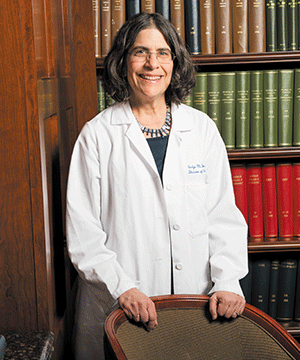
Dr. Evelyn M. Horn
Pulmonary hypertension is present in about one-third of patients with heart failure and complicates the management of this disease. “In many cases, right heart failure follows left heart failure, but management of difficult cases requires a special expertise and understanding of the interdependence of the right and the left ventricles,” says Evelyn M. Horn, MD, who has particular expertise in right heart failure. “The phenotype of heart failure has multiple etiologies, and not all heart failure behaves the same way. Because of the nuances and subtleties involved in advanced heart failure, identifying the optimal timing of therapeutic interventions is one of the challenges. It is essential to understand when therapies will or will not work, and when one has to move on to mechanical assist devices, or heart transplantation for heart failure and lung transplantation for pulmonary hypertension.”
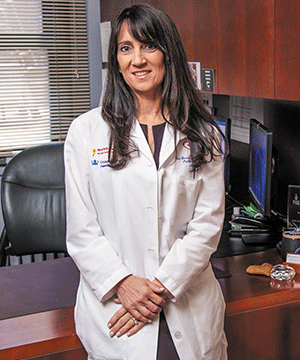
Dr. Erika S. Berman Rosenzweig
The pulmonary hypertension program at NewYork-Presbyterian/ Columbia, led by Erika S. Berman Rosenzweig, MD, and the pulmonary hypertension program at NewYork-Presbyterian/ Weill Cornell, led by Dr. Horn, serve as two of the seven clinical centers across the country participating in the National Heart, Lung, and Blood Institute’s PVDOMICS (Redefining Pulmonary Hypertension through Pulmonary Vascular Disease Phenomics) program.
“The PVDOMICS study includes all spectrums of pulmonary hypertension, including patients with heart failure. We are nearing the target of our initial enrollment and will be arranging for follow-up on these patients,” says Dr. Horn. “The program will augment the current classification based on shared biological features of 1,500 participants that place them at increased risk of developing pulmonary hypertension.”
“By systemically characterizing pulmonary hypertension patients utilizing clinical, biochemical, imaging, and physiological and pathological assessments, combined with genomic and RNA technology, we can improve our mechanistic and pathobiological understanding of the pulmonary vascular disease process,” says Dr. Berman Rosenzweig. “The goal is to be able to better target the right patient for the right therapeutic intervention.”
In the contemporary era, Extracorporeal Membrane Oxygenation (ECMO) is a mandatory tool to take care of patients with heart failure and pulmonary hypertension. The Adult ECMO Program at NewYork-Presbyterian/Columbia is one of the largest, most experienced, and most innovative ECMO programs in the world and has once again been recognized by receiving the “Platinum Level ELSO Award for Excellence in Life Support” from the Extracorporeal Life Support Organization (ELSO). The prestigious platinum award is the highest distinction given by ELSO, only achieved by a select number of institutions worldwide. Platinum Level recognizes programs that display exceptional care in the delivery of ECMO support in patients with severe cardiac or pulmonary failure. “With our knowledge and experience, our program can provide the best care and the best outcomes to patients with heart failure and pulmonary hypertension,” says Dr. Takeda.
Dr. Takeda’s expertise intersects with all phases of heart failure care, including pulmonary thromboendarterectomy (PTE), a challenging and complex procedure to address chronic thromboembolic pulmonary hypertension. “This a chronic condition in which patients develop pulmonary hypertension that can become life-threatening. PTE has been shown to be the best treatment in extending a patient’s survival,” says Dr. Takeda, who leads one of the largest programs in the country for this highly specialized surgery. “When we remove the obstructing thromboembolic material, symptoms such as shortness of breath, edema, and fatigue dramatically improve. But it requires careful patient selection, a surgical skill set, and a high level of postoperative medical care and management.”
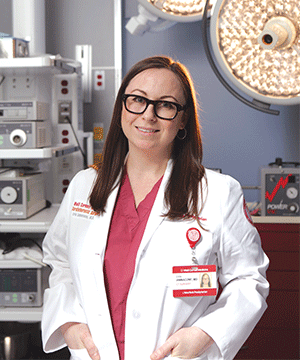
Dr. Erin Iannacone
The team at the NewYork-Presbyterian/Weill Cornell campus is also committed to a multidisciplinary approach to patients with chronic thromboembolic pulmonary hypertension. Erin Iannacone, MD, believes the best short-term and long-term outcomes following complex PTE surgery come from a collaborative effort between the medical and surgical teams caring for these patients. “Without the expertise of both the heart failure and postoperative critical care teams, a perfectly executed operation is unlikely to succeed,” says Dr. Iannacone.
Having trained in PTE surgery at the busiest program in the world, Dr. Iannacone knows that a thorough preoperative evaluation by the heart failure team and meticulous postoperative care are the keys to success. “Patients can benefit tremendously from PTE surgery but a successful operation is just the beginning,” she says. “Ongoing communication between the heart failure and surgical teams reassures the patients and their families that they are receiving the most up-to-date, innovative therapies long after their operation is completed.”
Taking Care of Heart Failure Patients
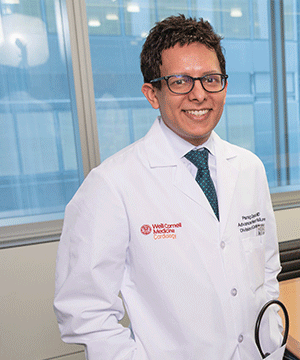
Dr. Parag Goyal
“The expansion of the advanced heart failure entity across the NewYork-Presbyterian enterprise comes at a time when we are growing additional heart failure services, such as the Heart Failure with Preserved Ejection Fraction — HFpEF — program,” says Dr. Horn. “Our HFpEF program is the first and only subspecialty program in New York dedicated to this unique subtype of heart failure. Patients with HFpEF, also known as diastolic heart failure, develop heart failure symptoms such as fatigue and shortness of breath despite normal heart pump function.” The HFpEF program, led by Parag Goyal, MD, MSc, combines treatment options with research in order to improve the care of this vulnerable population.
NewYork-Presbyterian/Columbia is the home for the biggest cardiac amyloidosis program in the tri-state area. The program offers novel therapies to cardiac amyloidosis patients in different phases of the disease, including heart transplantation. “Currently, we are conducting four phase 3 studies of novel therapies for cardiac amyloid patients,” says Mathew Maurer, MD, who was the lead investigator and the first author on the recent New England Journal of Medicine publication demonstrating the role of tafamadis in treating TTR amyloid patients. “By phenotyping patients with cardiac amyloid we can come up with new therapies that will change those patients’ lives.”
The heart failure groups also have established a strong collaboration with the cancer centers at both NewYork- Presbyterian/Weill Cornell and NewYork-Presbyterian/ Columbia. Novel protocols improve early identification and treatment of oncology patients who develop heart disease due to their cancer therapy. “This is a unique opportunity to help patients overcome the current cancer diagnosis that they are battling and protect them from future myocardial injury,” says Jayant Raikhelkar, MD.
Growing Role of Remote Care
An implanted hemodynamic monitoring system — CardioMEMS — is being used to remotely monitor and proactively adjust medications in patients with New York Heart Association Class III heart failure who have had a prior hospitalization. “Management is provided by a collaborative team of heart failure physicians and nurse practitioners,” notes Dr. Colombo. “In our first cohort of patients implanted, heart failure-related hospitalizations were reduced significantly.”
Dr. Horn and her team are pursuing a multi-tiered level of telemedicine efforts for remote monitoring of patients with chronic heart failure. The Community Tele-Paramedicine program uses video teleconferencing to deliver targeted, patient-centered, cost-effective acute care to patients’ homes via a bundle of innovative technologies. “Our team includes emergency physicians, heart failure cardiologists, a dedicated care manager, and full-time community paramedics,” notes Dr. Horn. “We have just completed a six-month pilot study with successful outcomes demonstrated with respect to improvement in medication reconciliation, adjustment of outpatient medication, appropriate referrals, care coordination, and decreased readmission in high-risk patients, as well as overall patient satisfaction.”
“Through this program, we can send patients home from the hospital sooner, avoid hospitalization, and even transition to hospice for patients who prefer not to return to the hospital,” continues Dr. Horn. “We also have developed an extension of the model to be used in less sick patients who may require titration of medicines soon after discharge.”
“There needs to be a true appreciation that heart failure is a life-threatening illness,” states Dr. Farr. “In stage three and certainly for class four heart failure, the one-year prognosis is worse than some of the worst cancers. Patients in heart failure, even with early-stage symptoms, fare much better when managed together with heart failure programs. In fact, the very advanced therapies such as heart pumps and transplant should be considered earlier in disease progression and may be the best strategy for better long-term survival.”
In summary, says Dr. Uriel, “Today, in NewYork-Presbyterian, we can offer heart failure therapies across a wide variety of conditions and stages of disease, from diagnosis, medical management, and monitoring to advanced heart failure options such as heart transplantation and LVAD support. We will be there for the patients in each stage of the disease and try to make sure they get the best chance to live a long life and enjoy a good quality of life.”



